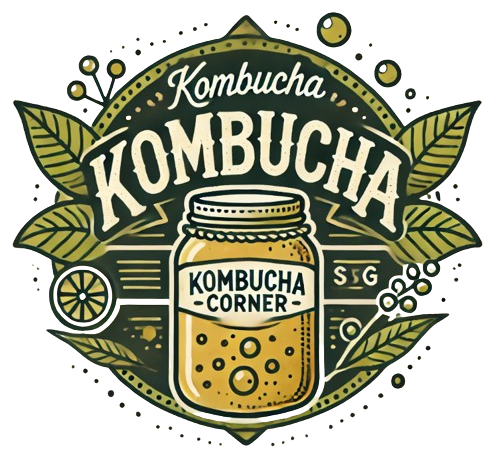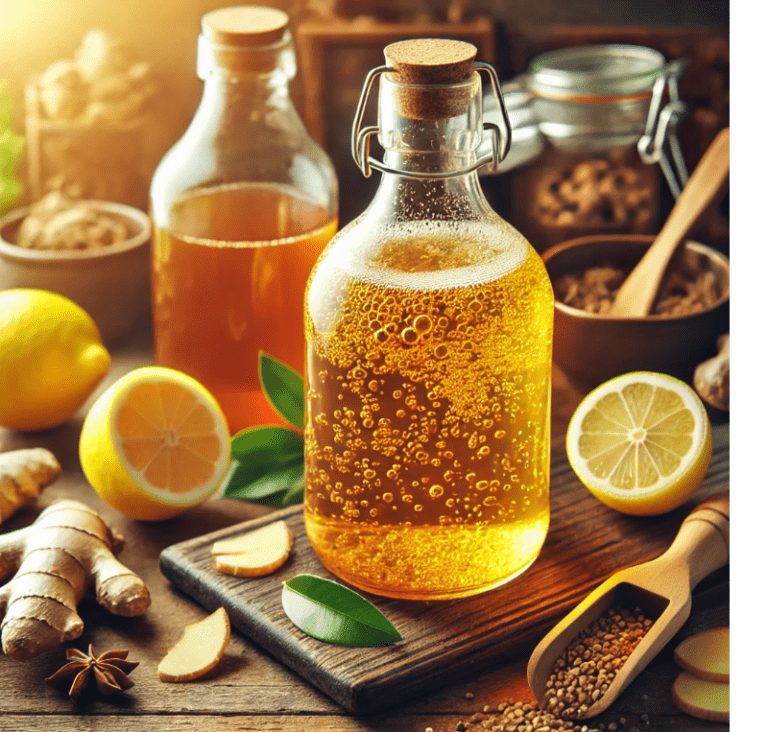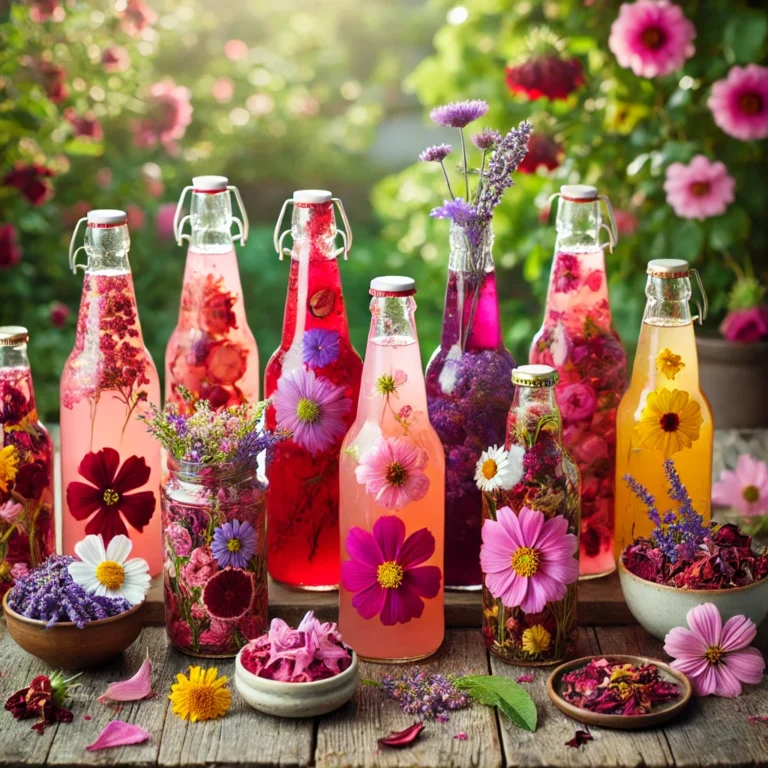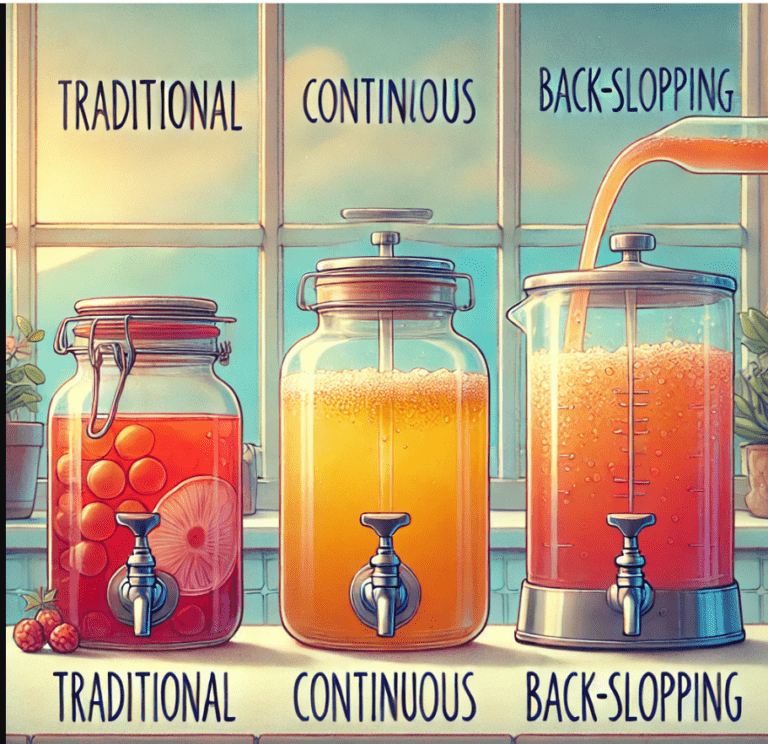Does Kombucha Have Caffeine? Sip Back and Let’s Find Out!
Alright, kombucha lovers, caffeine fiends, and curious cats alike—let’s settle this once and for all. You’re sipping on that tangy, fizzy goodness,…
Alright, kombucha lovers, caffeine fiends, and curious cats alike—let’s settle this once and for all. You’re sipping on that tangy, fizzy goodness, and suddenly it hits you: Does kombucha have caffeine? Is that tiny tingle you feel the power of probiotics, or is it the infamous buzz of caffeine? Grab your favorite booch (or a cup of coffee, no judgment), and let’s dive into this effervescent enigma.
The Caffeinated Truth: Does Kombucha Contain Caffeine?
Spoiler alert: Yes, kombucha contains caffeine. But before you start picturing kombucha as a sneaky little coffee cousin, let’s break it down. Kombucha is brewed with tea—usually black or green tea, both of which naturally contain caffeine. And just like how you can’t make a proper martini without gin (sorry, vodka lovers), you can’t make kombucha without tea. So, the caffeine is there, but it’s playing it cool.

How Much Caffeine Are We Talking About Here?
So, how much caffeine is in kombucha? The answer is: not much. While a standard 8-ounce cup of black tea can hit you with 40-70 milligrams of caffeine, kombucha only delivers around 10-25 milligrams per serving [source]. That’s more like a gentle nudge than a caffeine kick to the face. In comparison, coffee chuggers are looking at about 95 milligrams per 8-ounce cup [source]. Kombucha is basically the decaf tea of the fizzy drink world.
Kombucha vs. Coffee: The Cage Match
Okay, so kombucha has some caffeine, but how does it stack up against coffee? If coffee is the Usain Bolt of caffeine, kombucha is more like a leisurely afternoon jog. You’re not going to be bouncing off the walls after a glass of booch. Instead, you’ll get a light, happy buzz—like the kind you get from petting a cute dog or finding a forgotten $20 in your pocket. Kombucha is perfect for those days when you need a little pep in your step without spiraling into over-caffeinated chaos.
Is There Such a Thing as Caffeine-Free Kombucha?
You bet your SCOBY there is! If you’re looking to sip without the zip, there are caffeine-free kombucha options out there. Brands like Remedy and Humm have got your back with brews made from decaffeinated or herbal teas [source]. And if you’re a DIY kombucha brewer, you can go rogue and use teas like rooibos or hibiscus, which are naturally caffeine-free. Just remember, you’ll get a slightly different flavor profile, but hey, variety is the spice of life, right?

Does Kombucha Need Caffeine to Survive?
The short answer is: kind of. The caffeine in tea is like kombucha’s lifeblood—it feeds the SCOBY (Symbiotic Culture Of Bacteria and Yeast), helping it ferment and do its magical, probiotic thing [source]. However, if you’re brewing with low-caffeine or caffeine-free teas, the process will still work, albeit at a more relaxed pace. Think of it like kombucha on a spa day—less caffeinated hustle, more zen bubbles.
Booch and Booze: Does Caffeine Affect Kombucha’s Alcohol Content?
You might be thinking, “Wait, kombucha has caffeine and alcohol? Is this my new party drink?” Hold your horses. While it’s true that kombucha can contain a teeny tiny amount of alcohol (thanks to fermentation), the caffeine doesn’t really influence that. Most store-bought kombucha has less than 0.5% alcohol by volume [source], which means you’d need to drink a bathtub’s worth to feel any effects. Not recommended, unless you’re into extreme hydration.
What’s the Buzz on Reddit? Kombucha Caffeine Talk
Ah, Reddit—the internet’s watering hole for all things random and oddly specific. If you pop into a kombucha subreddit, you’ll find tons of caffeine chatter. Redditors love to compare notes on different brands, caffeine levels, and how various teas impact their homemade booch [source]. If you’re the type who likes to deep dive into fermentation geekery, it’s worth a scroll.
Which Kombucha Brands Are Bringing the Caffeine (or Not)?
Let’s talk specifics.
- GT’s Kombucha: The OG of the kombucha world, GT’s offers plenty of caffeinated options, but also a few gems like Pure Love for those seeking a caffeine-free experience [source].
- Synergy Kombucha: Another GT’s line, typically packing 10-15 milligrams of caffeine per serving. Just enough to keep you from napping during that mid-afternoon slump.
- Humm Kombucha: Your go-to if you want to enjoy kombucha without the buzz. Their flavors are as fun as their brand name, and they cater to the caffeine-sensitive crowd [source].
Homebrew Kombucha: Caffeine Content Tips for DIY Enthusiasts
Brewing kombucha at home is like crafting your own bubbly potion—full of endless possibilities and flavors. But when it comes to controlling caffeine content, there are a few key things to keep in mind:
Choosing Your Tea Base: The Caffeine Source
The type of tea you use has the most significant impact on the caffeine content of your homebrewed kombucha. Here’s a quick guide:
- Black Tea: This is the most common base for kombucha and contains the highest amount of caffeine, around 40-70 mg per 8-ounce serving before fermentation. This tea will give you a more robust flavor and a moderate caffeine content in the final brew.
- Green Tea: A popular alternative, green tea contains about 20-45 mg of caffeine per 8-ounce serving. Kombucha brewed with green tea tends to have a lighter, more delicate flavor, with a lower caffeine content.
- White Tea: Even lower in caffeine, white tea has about 15-30 mg per 8-ounce serving. It’s a great choice for a subtler, floral kombucha with minimal caffeine.
- Herbal Teas: Teas like rooibos, hibiscus, or chamomile are naturally caffeine-free and can be used to brew kombucha. However, using these teas might slow down the fermentation process since they lack the caffeine and other nutrients that traditional teas provide.
Tip: You can blend different teas to create a custom caffeine level that suits your taste and dietary needs.

Steeping Time and Caffeine Extraction
The length of time you steep your tea before fermenting can also affect the caffeine content:
- Longer Steeping Time: A longer steep will extract more caffeine from the tea leaves. If you’re looking for a kombucha with a bit more kick, consider steeping your tea for 10-15 minutes.
- Shorter Steeping Time: If you want to reduce the caffeine content, steep the tea for a shorter time, around 3-5 minutes. This will give you a milder base for your kombucha.
Tip: Some homebrewers even do a “first wash” by steeping the tea briefly, discarding the water, and then re-steeping the leaves to reduce the caffeine content further.
Fermentation Time, Caffeine, and Alcohol Content
While the fermentation process primarily converts sugars into alcohol and acids, it can also slightly reduce the caffeine content:
- Longer Fermentation: Extending the fermentation period allows the kombucha culture (SCOBY) more time to consume the nutrients in the tea, including some of the caffeine. However, the difference isn’t huge, so don’t rely solely on fermentation time to reduce caffeine.
- Alcohol Content: It’s important to note that homebrewed kombucha can often exceed 0.5% alcohol by volume (ABV), especially if the fermentation process is long or the brew is left unrefrigerated after fermenting. Unlike commercially available kombucha, which is tightly regulated to keep alcohol levels below 0.5%, homebrew can sometimes reach 1% ABV or more. The alcohol content in homebrew is harder to measure accurately without specialized equipment, so it’s a good idea to be mindful of fermentation times and storage conditions if you’re concerned about alcohol levels [source].
Tip: If you want to reduce alcohol content, consider shortening the fermentation time and refrigerating your kombucha as soon as it’s reached the desired taste and fizziness.
Decaf Tea Options for Homebrew
If you’re sensitive to caffeine or want to brew kombucha for evening sipping, decaffeinated tea is your best friend. Decaf black or green teas retain the traditional kombucha flavor while drastically reducing caffeine content, usually to about 2-5 mg per 8-ounce serving.
Tip: When using decaf tea, ensure that it’s naturally decaffeinated (often using the CO2 method) to avoid any harsh chemicals that could interfere with your SCOBY.

Experimenting with Caffeine-Free Alternatives
Feel like getting creative? Try brewing your kombucha with caffeine-free herbal teas. While this can change the flavor profile and fermentation dynamics, it opens up a world of possibilities:
- Rooibos Kombucha: Naturally sweet and slightly nutty, rooibos makes a rich, caffeine-free kombucha.
- Hibiscus Kombucha: Tangy and vibrant, hibiscus creates a tart, caffeine-free kombucha with a stunning red hue.
- Peppermint Kombucha: Refreshing and calming, peppermint adds a cool twist to your brew, perfect for summer sips.
Tip: Since these teas don’t contain the same nutrients as true teas, you might want to add a small amount of green or white tea (even decaf) to help the fermentation process along.
Conclusion: Homebrew Kombucha—Caffeine Your Way
Homebrewing kombucha offers the ultimate control over your caffeine intake. Whether you’re a caffeine connoisseur or a decaf devotee, you can tweak your tea base, steeping time, and fermentation process to craft the perfect kombucha for your needs. Remember, the beauty of homebrewing lies in experimentation, so don’t be afraid to try different methods until you find your ideal caffeine balance. And keep an eye on that alcohol content—your kombucha might have a little more kick than you expect! Happy brewing!
References
- Healthline: Does Kombucha Have Caffeine?
- Live Eat Learn: Does Kombucha Have Caffeine?
- Women’s Health Magazine: Does Kombucha Have Caffeine?
- Mayo Clinic: Caffeine Content
- Humm Kombucha: Our Kombucha
- Remedy Drinks: Remedy Kombucha
- The Spruce Eats: Kombucha FAQs
- NPR: Kombucha Alcohol Content
- Reddit – r/Kombucha: Kombucha Discussions
- GT’s Living Foods: GT’s Pure Love Kombucha






